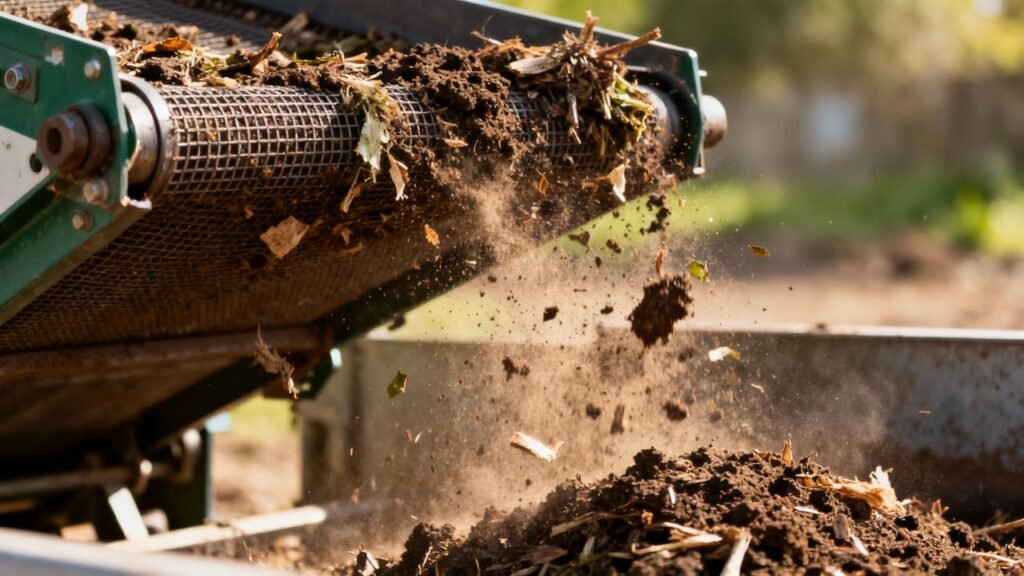If you’ve ever tried selling bulk soil, you know not all dirt moves at the same pace. Some stockpiles sit untouched for months, while others sell out in days. The difference often comes down to one simple factor — quality. More specifically, screened topsoil.
Today’s contractors, landscapers, and homeowners are increasingly aware that quality soil saves time, labor, and money. That’s why professionals rely on topsoil screeners — machines designed to separate rocks, roots, and debris to produce clean, uniform, and market-ready soil. The result? Screened topsoil for sale moves faster, earns better margins, and keeps customers coming back.
Let’s explore why screened topsoil commands such strong demand, what makes it more valuable, and how you can position your business to take advantage of the growing topsoil market demand.
1. What Is Screened Topsoil — and Why Does It Matter?
Screened topsoil is natural soil that’s been mechanically filtered to remove clumps, stones, sticks, and other unwanted materials. The process produces a fine, smooth, and consistent texture ideal for landscaping, gardening, and turf installation.
Using a screener ensures the soil is easier to spread, mixes evenly with compost or fertilizer, and supports healthy root growth. Whether you’re grading a new yard, laying sod, or filling garden beds, screened soil provides a superior foundation for plant success.
The benefits of screened topsoil are visible right away:
- Cleaner, more uniform appearance
- Easier handling and spreading
- Improved drainage and aeration
- Reduced risk of weed contamination
- Enhanced customer satisfaction
These advantages make screened topsoil the gold standard for landscaping suppliers and contractors — and the reason it sells faster than unscreened alternatives.
2. The Quality Advantage: Why Customers Prefer Screened Topsoil
For buyers, quality means confidence. Landscapers and homeowners want soil that’s ready to use without surprises. Unscreened soil often contains rocks, roots, and construction debris that can cause uneven lawns, poor drainage, or damage to planting tools.
Quality screened soil eliminates those headaches. Its fine consistency ensures even seed germination, uniform turf growth, and easy grading. It’s also lighter and easier to transport — a key selling point for suppliers delivering in bulk.
Customers who buy screened topsoil quickly learn that it saves both time and labor. They can unload, spread, and plant immediately without additional preparation. This convenience creates strong repeat business and word-of-mouth referrals — two drivers behind why screened topsoil outsells unscreened varieties.
3. How Topsoil Screening Improves Product Value
The act of screening does more than clean the soil — it transforms its market potential. Using portable or stationary screeners, suppliers can refine their raw material into a consistent, high-value product.
Here’s how screening enhances profitability:
- Increased yield: You recover usable soil from what would otherwise be waste.
- Consistent grading: Customers know exactly what they’re getting with every load.
- Higher price point: Screened soil commands a premium in most markets.
- Reduced complaints and returns: Fewer impurities mean happier buyers.
Screening isn’t just a production step — it’s a value-creation process. In competitive markets, the ability to deliver consistent, clean soil sets top suppliers apart.
4. The Growing Topsoil Market Demand
The topsoil market demand has surged in recent years, driven by multiple industries and lifestyle trends:
- Residential landscaping: Homeowners invest more in outdoor spaces and lawn improvement.
- Commercial development: Construction projects require large volumes of graded soil for finishing and erosion control.
- Environmental restoration: Reclamation and green infrastructure projects need high-quality soil for planting and reforestation.
- Urban agriculture: Rooftop gardens and city farms depend on nutrient-rich, screened soil.
This expanding demand means that suppliers who can deliver screened topsoil for sale are well-positioned to grow their customer base.
Unscreened soil still has its uses — like backfilling or rough grading — but screened soil offers broader applications and higher resale value. Simply put, the cleaner the soil, the stronger the market response.
5. Why Screened Topsoil Sells Faster
When buyers compare two soil products — one screened, one not — the difference is immediately clear. Screened soil looks cleaner, feels smoother, and spreads effortlessly. It’s also easier to describe and market because it meets predictable quality standards.
Here’s why it consistently outsells unscreened dirt:
- Customer perception: Buyers associate screened soil with professionalism and reliability.
- Ease of use: Landscapers can unload and start work immediately, saving labor hours.
- Better outcomes: Projects completed with screened soil have superior visual and structural results.
- Fewer complaints: Satisfied customers reorder more frequently and refer others.
For soil suppliers, that means faster turnover, lower storage costs, and a better reputation. In a word — momentum.
6. Selling Screened Topsoil: Understanding Buyer Psychology
To successfully sell screened topsoil, it’s important to recognize what your buyers value most:
- Consistency: They want uniform soil texture across all deliveries.
- Cleanliness: They expect no rocks, weeds, or roots.
- Moisture balance: They prefer soil that’s not too dry or wet, making it easier to spread.
- Local sourcing: Many customers appreciate soil that’s been screened and processed locally.
Marketing screened soil as a ready-to-use product instantly sets it apart. Emphasize the time savings and quality results — these are your strongest selling points.
A simple way to build trust is through visual proof. Display photos or short videos of your soil screening process and the finished product. When customers see clean, rich soil being processed through a screener, they associate your brand with transparency and quality.
7. How to Set Pricing for Screened Topsoil
Because screened topsoil offers higher value, it should command a premium price. However, pricing must also remain competitive within your local market.
Here are a few tips for pricing strategy:
- Compare local rates: Research what other landscaping soil suppliers charge for bulk screened soil.
- Emphasize benefits: Justify higher prices through superior quality and time savings.
- Offer volume discounts: Encourage larger orders to increase turnover.
- Bundle with services: Include delivery or spreading options for added convenience.
On average, screened topsoil for sale is priced 20–40% higher than unscreened material — but customers gladly pay the difference because it guarantees consistency and performance.
8. Pairing Screened Topsoil with Compost and Fill Dirt
Smart suppliers don’t stop at screening topsoil — they also diversify. Many businesses increase revenue by offering complementary materials like fill dirt and compost.
- Compost: When mixed with screened topsoil, it creates nutrient-rich planting soil.
- Fill dirt: Ideal for leveling before applying topsoil layers.
Offering pre-blended products, such as “garden mix” or “lawn base,” provides convenience for buyers and expands your product catalog. Each option appeals to different customer segments, increasing total sales opportunities.
9. The Role of Equipment: Choosing the Right Topsoil Screener
The heart of your operation is the screener. Investing in reliable equipment ensures consistent production quality and reduced downtime.
When choosing a screener, consider:
- Capacity: Match throughput to your volume goals.
- Portability: Mobile units allow screening at different job sites.
- Ease of maintenance: Look for quick-change screens and self-cleaning features.
- Durability: Opt for rugged steel construction to handle heavy use.
Portable topsoil screeners are ideal for small to mid-sized suppliers. They’re cost-effective, easy to transport, and deliver professional-grade soil with minimal setup time.
10. How to Promote Your Screened Topsoil
To accelerate sales, market your screened topsoil like a premium product:
- Highlight benefits in listings: Use keywords like “quality screened soil” and “ready-to-use topsoil.”
- Leverage local SEO: Optimize your Google Business profile with phrases like “screened topsoil for sale near me.”
- Show the process: Use short videos of screening equipment in action.
- Target repeat customers: Landscapers and contractors often need recurring bulk deliveries.
A strong online presence combined with high product quality ensures consistent lead flow and long-term growth.
11. The Future of Screened Topsoil
As sustainability and eco-friendly construction gain momentum, demand for screened topsoil will continue to rise. Municipal projects, commercial landscaping, and regenerative agriculture all depend on clean, reusable soil sources.
By integrating efficient screening equipment and focusing on consistent quality, suppliers can meet this demand while minimizing waste. In fact, screened topsoil represents a cornerstone of modern, sustainable land development — where every cubic yard of earth is treated as a valuable resource.
Conclusion
In a competitive market, screened topsoil stands out for one reason: quality sells. Buyers want soil that’s clean, consistent, and ready to use — and they’re willing to pay for it.
By investing in topsoil screeners, suppliers can turn raw, inconsistent dirt into a high-demand product that practically sells itself. Cleaner soil means happier customers, stronger reviews, and faster turnover — the key ingredients for long-term business growth.
As the topsoil market demand continues to climb, the suppliers who prioritize quality screened soil will be the ones leading the way — one bucket, one screen, and one satisfied customer at a time.



